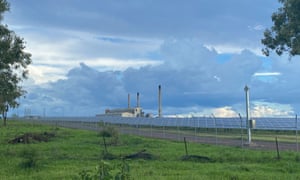Exclusive: Federal government gave proponent of coal-fired power plant a $4m grant despite having no energy sector experience
The proponent of a coal-fired power station at Collinsville in north Queensland
was asked to lodge an application for a $4m feasibility study grant two
days after it had already been publicly announced as the recipient.
The government’s support for the project has broadly been considered a concession to pro-coal Nationals and an effective political wedge in Queensland coal country.
Guardian Australia has been investigating how Shine Energy managed to secure the grant of up to $4m for a feasibility study, despite having no energy sector experience and having never completed a project.
An initial business case submitted by Shine in late 2018 did not meet the criteria to be shortlisted for the government’s flagship power generation scheme, the Underwriting New Generation Investment program.
That same day the shortlist was announced – during the federal election campaign in March, 2019 – the government established a secondary $10m program to subsidise projects in north and central Queensland, the Supporting Reliable Energy Infrastructure program.
On 8 February this year, the energy minister, Angus Taylor, released a joint statement with three colleagues – deputy prime minister Michael McCormack, northern Australia minister Keith Pitt and Capricornia MP Michelle Landry – announcing Shine Energy would be given funding from the grant program.
“This delivers on an election commitment with grant funding,” the statement said.
This week, the Department of Industry, Science, Energy and Resources confirmed Shine was contacted two days after the announcement and then invited to apply.
“On 8 February 2020, the government announced the first three projects to be pursued under the Supporting Reliable Energy Infrastructure program, including up to $4m to support Shine Energy Pty Ltd’s feasibility study for a proposed 1GW … coal plant at Collinsville in Queensland,” the department said in a statement.
“On 10 February 2020, Shine Energy [was] asked to submit an application seeking support from the Supporting Reliable Energy Infrastructure program by the Department of Industry, Science, Energy and Resources.”
While the government notionally awarded the funding to Shine Energy under a formal scheme, the department developed specific grant guidelines for the company – suggesting grants from the program were awarded on an ad hoc basis, rather than via a competitive process.
“It is normal practice for specific grant guidelines to be developed for a one-off or ad hoc grant,” the department said.
“All grant opportunity guidelines (competitive or ad hoc) are specific to the program and designed by the relevant portfolio agency, following the seven key principles for grants administration as set out in the commonwealth grant rules and guidelines, for their specific program.”
In his statement on 8 February, Taylor said that an “independent strategic study” had identified system strength was a concern in central and north Queensland, and that new generation was a priority to meet the needs of energy customers.
The Queensland government, which manages the state’s electricity grid, has said it was not aware of any study that showed additional coal-fired generation was needed in the north of the state.
The state’s most recent analysis showed that any new coal-fired power station would require a wholesale price of $120 per megawatt hour (MWh) – double the current average wholesale price in Queensland.
In its own systems plan, the Australian Energy Market Operator said that due to a surge in renewable connections in north Queensland and an “energy surplus”, any large-scale generator connections would not be efficient until other power generators were shut off.
A spokesman for Taylor said the 8 February announcement had “stated which organisations were eligible to apply for funding” under the program. The department claims the grant – reduced to $3.3m – was then formally awarded to Shine in June.
However, the February announcement clearly said the projects had been awarded funding.
“We are delivering on our election commitments and investing in the future with up to $4 million to investigate the feasibility of a [coal plant],” Pitt said in the February statement.
Landry said in the same statement: “I’m glad to see the money to support job-creating projects will start to flow.”
Shine Energy was also contacted and offered the opportunity to comment.
The company’s proposal has appeared to stutter in recent weeks. The chief executive, Ashley Dodd, a Birriah traditional owner, accused the government of attempting to “white clad” the company by replacing him with an Anglo-Saxon.
The government has not yet paid any grant funding to Shine, amid a dispute about the amount. The company was offered $3.3m in June based on an assessment by the department but is seeking the full $4m initially announced.

No comments:
Post a Comment